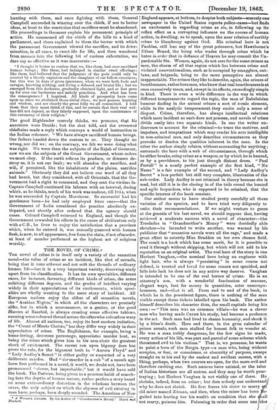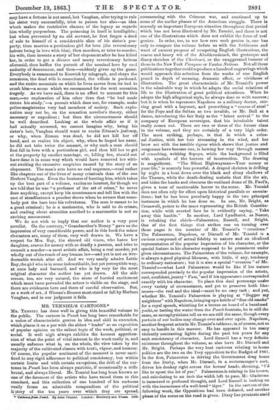THE NOVEL OF CRIME.*
THE novel of crime is in itself only a variety of the sensation novel—the value of crime as an incident, like that of miracle, being that it runs athwart and not with the threads of ordinary human life—but it is a very important variety, deserving study apart from its classification. It has its own specialties, different races, for instance, favouring different kinds of crime, the sexes relishing different degrees, and the grades of intellect varying widely in their appreciations of its excitements, which speci- alties are wholly wanting to the mere story of incident. All European nations enjoy the oldest of all sensation novels, the "Arabian Nights," in which all the characters are precisely alike, but in which a necromancer, or a genius, or the good Haroun al Raschid, is always creating some effective tableau, running some coloured thread across the otherwise colourless warp of life. Almost all nations, too, enjoy its best modern imitation, the "Count of Monte Christo," but they differ very widely in their appreciation of crime. The Englishman, for example, being a home-loving, decorous personage, appreciates murder best, as being the crime which gives him in his arm-chair the greatest shock of excitement. The recent run upon bigamy does but prove the rule, for the bigamist both in "Aurora Floyd" and -" Lady Audley's Secret" is either guilty or suspected of a very deliberate murder, Had " themurder in a cab " of a month ago been first performed in a novel, it would, we doubt not, have been pronounced "clever, but improbable ;" but it would have sold the book. The Parisian, being given to a prurient habit of search- ing into the depths of human nature, rather prefers a story based on some extraordinary distortion in the relations between the sexes, the only subject on which the abysses of evil existing in man have, perhaps, been deeply sounded. The American of New • A Woman's Ransom. By the Author of "Grandmother's Money." Hurst and 3Mackett England appears, at bottom, to despise both subjects—scarcely one newspaper in the United States reports police-cases—but finds an excitement in regarding 'crime as sin, in following up its reflex effect as a corrupting influence on the course of human action, in dwelling, so to speak, upon the near relation of earthly crime to blasphemy against God. His criminal hero is not Faublas, still less any of the great poisoners, but Hawthorne's. Ethan Brand, the being who wades through crime which he hates in order that in defiance of Heaven he may commit the Un- pardonable Sin. Women, again, do not care for the same crimes as men, the charm of all that region which lies between crime and violated conventionalism, such as is occupied by smugglers, out- laws, and brigands, being to the more perceptive sex almost inappreciable. The crimes they like to describe, again, the crimes of heartlessness, ratherbore men, who know that real heartlessnessis at once excessively mean, and, except in its effects, exceedingly simple in kind. There is even a wide difference in the way in which different temperaments regard the topic, the man of Rabelaisian humour finding in the animal crimes a sort of comic element, while in the analytic temperament they excite only a sense of disgust. Crime, therefore, has always intellectual relations which mere incident as such does not possess, and novels of crime divide easily into two separate kinds. In one the writer en- deavours to account for the criminal—to trace the motives, and impulses, and temptations which may render his acts intelligible to non-criminal men, and only describes circumstances as they provoke or deaden the qualities inherent in the man. In the other the author simply relates, without accounting for anything ; surrounds the hero with a web of circumstances, through which he either breaks, using crime as a weapon, or by which he is hunted, as by a providence, to his just though distant doom. "Paul Ferrol]" is a nearly perfect example of the first kind, "No Name" is a fair example of the second, and "Lady Audley's Secret" a less perfea but still very complete, illustration of the sub-order. Lady Audley is not criminal in theory because she is mad, but still it is in the closing in of the toils round the hunted and agile leopardess, who is supposed to be criminal, that the specific interest of the book consists.
Our author seems to have studied pretty carefully all these varieties of the species, and to have tried very diligently to unite their recommendations. If we might venture to guess at the genesis of his last novel, we should suppose that, having achieved a moderate success with a novel of character—the Tresdailes in "Grandmother's Money" were decidedly able sketches—he intended to write another, was warned by his publisher that "sensation novels were all the rage," and made a great effort to outstrip Miss Braddon on her own chosen field. The result is a book which has some merit, for it is possible to read it through without skipping, but which will not add to his reputation as an original artist. The real hero of the story is one Herbert Vaughan,—the nominal hero being an engineer with light hair, who is always "persisting" in some course not defined, is trusted and loved for some reason not specified, and falls into luck he does not in any active way deserve. Vaughan is intended to be one of the real heroes of crime. He is an attorney's son, with a wonderful fascination of manner, elegant ways, lust for money in quantities, utter unscrupu- lousness, and—that is all. From end to end of the book, in which he is the prominent figure, there is nothing of the man visible except these tickets labelled upon his back. The author himself describes his character thus, the small capitals being his own : — " This man was no common villain—he was a clever man who having made CRIME his study, had become a professor, in the art. Such men had lived to shame humanity, and shock it by a felon's death. Here and there, in the grim calendar of
prison annals, such men stalked for honest folk to wonder at. He was a man trebly dangerous, for the few signs he made, every aztiotrof his life, was part and parcel of some scheme which threatened evil to his victims." That is, we presume, he wants to paint a hero of the Borgia type—a man who, being without scruples, or fear, or conscience, or obscurity of purpose, sweeps straight on to his end by the easiest and swiftest means, with a liking, perhaps, when two courses are open, for the more evil and therefore exciting one. Such natures have existed, or the tales of Italian historians are all untrue, and they may be worth pour- traying ; but Herbert Vaughan is not visibly one of them. He shrinks, indeed, from no crime ; but then nobody can understan why he does not shrink. He first forces his sister to marry old miser named Zitman, and then, when the miser has been e- guiled into leaving her his wealth on condition that she all not marry, poisons him. Poisoning in order that some one may have a fortune is not usual, but Vaughan, after trying to rule his sister very successfully, tries to poison her also—an idea which makes the restrictive clauses of the legacy as regards him wholly purposeless. The poisoning in itself is intelligible ; but when prevented by an old servant, he first forges a deed of sale to himself of a considerable slice of his sister's pro- perty, then marries a portionless girl for love (the reversionary heiress being in love with him), then murders, or tries to murder, his wife, then invents a story of her elopement after he has killed her, in order to get a divorce and marry reversionary heiress aforesaid, then baffles the pursuit of the nominal hero by cool audacity of demeanour, and then—suddenly gives up the game. Everybody is summoned to Keswiok by telegraph, and obeys the summons, the dead wife is resuscitated, the villain is pardoned, and the entire mountain on which he lives moves from its bed to crush him—a scene which we recommend for the next sensation tragedy. As we have said, there is no effort to account for this man,—no explanation of him other than that "he had made CRIME his study,"—a pursuit which does not, for example, make police-magistrates very bad members of society. Such expla- nation may not be, on the sensation novelist's theory, either necessary or expedient ; but then the circumstances should be well described. Looking at the whole affair as if it had actually occurred, we cannot imagine why, being his sister's heir, Vaughan should want to excite Zitman's jealousy, or why, when Zitman was dead, he did not kill her off hand, and so realize his object, why, when he forged her name, he did not take twice the amount, or why such a man should first fall in love with a portionless girl, and then kill her to get at the property by another marriage, or, killing her, should not have done it in some way which would have removed her with- out exciting the excessive suspicion caused by the story of an elopement. The man's acts have no real sequence,—read rather like chapters out of the lives of many criminals than of the one Herbert Vaughan. Even the business of hunting him, which takes up the best part of a volume, excites no interest, for though we are told that be was "a professor of the art of crime," he never does anything, except keep his countenance and tell lies with the sort of steadfastness a poacher shows when he swears that some- body put the hare into his velveteens. The man is meant to be a great criminal ; he is a marionette, who is said to do crimes, and reading about atrocities ascribed to a marionette is not an exciting amusement.
We do not wish to imply that our author is a very poor novelist. On the contrary," Grandmother's Money" gave us the impression of very considerable power, and in this book the minor characters are, many of them, very well drawn in. We have a respect for Mrs. Ray, the shrewd old vixen, who hates her daughter, craves for money with so deadly a passion, and tries to commit a murder—a most artistic affair, being a real murder, yet wholly out of the reach of any human law—and yet is not an irre- deemable wretch after all. And we very nearly admire Lettie Ray, the girl who is in some indescribable, but yet perceptible way, at once lady and barmaid, and who is by very far the most original character the author has yet drawn. All the side scenes, too, are very natural, the sense of hurried excitement which must have pervaded the actors is visible on the stage, and there are evidences here and there of careful observation. But, as a work of art, A Woman's Ransom must stand or fall by Herbert Vaughan, and in our judgment it falls.



































 Previous page
Previous page